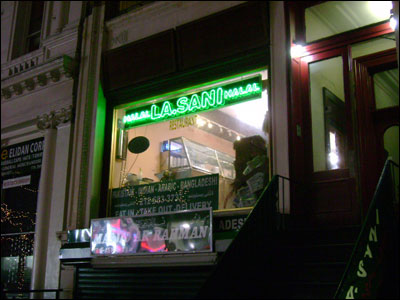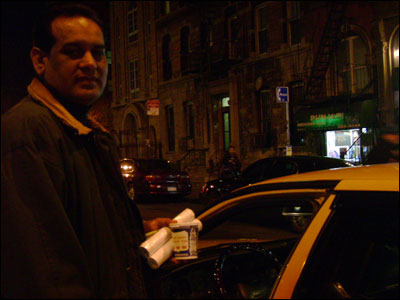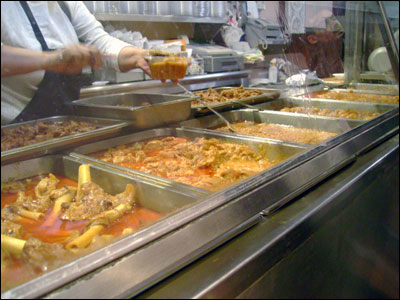
Life behind the wheel
Faisal Butt, 32, isn’t an Alliance member — he prefers to fly solo, and by and large, doesn’t have too many complaints. Wearing a tight sweater to show off his muscled torso, with a shaven head and trendy patch of hair under his lower lip, Butt is the picture of a young American on the make. One of his regular stops is the Punjabi Grocery and Deli on East First Street at First Avenue where he emerges after a meal of spinach curry and cauliflower curry with naan, clutching the requisite superheated cup of spiced tea enjoyed by his fellow drivers. (Cabbie joints often serve their tea scalding hot, so that the drivers can nurse their cup until their next stop.) “I eat lots of different kinds of food,” Butt says. “My BP (blood pressure) goes up. So sometimes I eat simple like this.”
Yellow cabs throng this spot. Parking is relatively plentiful, and there are two good restaurants here: Punjabi Grocery, an Indian vegetarian takeout place with a metal counter at which drivers eat standing up; and Chutney, a Pakistani-run establishment with space enough for two tables.
Like most cabbie joints, both restaurants stock supplies such as receipt paper rolls, trip-sheets, engine oil, wiper fluid, pain-relievers, and antacids. Punjabi Grocery also stocks CDs of Bollywood hits and Sikh devotional music. Its window boasts a poster of a dreamy-eyed Sikh saint, Guru Nanak, and the Sikhs’ main shrine, the Golden Temple of Amritsar, India. A large number of Indian and Pakistani drivers in New York come from the state of Punjab, split between the two countries by the 1947 partition. So Faisal Butt, a Pakistani Punjabi, has a lot in common with the Indian Sikhs, not least the language. He exchanges hearty greetings with the men behind the steam table again before he leaves.
For a visitor riding shotgun, he’s an entertaining guide to the various aspects of cabbie-dom. A first lesson is that drivers keep each other informed. Although cell phones — even those with hands-free sets — are prohibited by the Taxi and Limousine Commission, almost everyone uses them to share information about the demand for cabs on the street. It’s also the perfect time to catch up with family back home, for whom it is now daytime. Butt’s plan offers him free nighttime calls, so why would he waste them? “JFK is stripped?” he confirms with his friend Umar Patel, whose call is signaled by a loud blast of a recent Bollywood number, “Kajra Re,” a song exalting the kohl-lined eyes of the beauteous Aishwarya Rai. John F. Kennedy International Airport has just two lines of cabs at the stand, he learns, so he heads there. “$50 in an hour, easy,” he announces. On the way, he volunteers the information that his friend “Patel,” a Pakistani, has earned the sobriquet because of his penchant for Indian women from the state of Gujarat with that ubiquitous surname. He passes a street hail to whom he yells that he’s headed to the airport. “I’m not supposed to refuse him, but he’s smiling, having a good time,” he says. “That kind of guy — he understands.”
Having come to the United States at 16 with his family, Butt became enamored by the Western life he saw friends and relatives his age enjoying. While his family returned to Pakistan, he stayed on and is now a citizen. He describes a tortuous route through the immigration processes, including marriage to and subsequent divorce from a Japanese-American woman. He lives by himself — displaying a rare extravagance — paying $1,000 in rent for an apartment in Jackson Heights, Queens. “Roommates got a lot of issues,” he says. “I’ve been living by myself for a long time.”
The medallion owner from whom he leases his taxi offers the seventh night’s hire free if he pays for $600 for six nights, but he doesn’t take it. Unlike many other drivers, he is just earning for himself — his family in Pakistan has its own means of support. In the little free time that he has, Butt works out for two hours almost every day. “Feel my bicep,” he says. It’s impressive. He’s also recovering from a broken heart — his Pakistani girlfriend of five years recently left him to marry a doctor from Pakistan. He was devastated, and took three months off to visit his parents and convalesce. Now he’s back, and “hitting on” two girls who work at two different Dunkin’ Donuts, he says — one a Pakistani, and the other an Indian Punjabi.
He has the New York idiom down pat. “You’re dealing with a pro, schmuck,” he yells out his window at a hapless civilian trying to shift onto his lane in front of him.

A waiting life
As we enter the airport taxi lane, Butt starts pointing out the sights. Adjacent to a taxi lot, there’s a concrete clearing set aside for devout Muslims’ prayers, on which a couple of African drivers are prostrated on prayer rugs as they await their turn to move up to the dispatcher. “And that’s where we play cricket when the lot’s full,” Butt says, pointing to the other side of the road.
The lot, as his friend had informed him, has just two columns of cabs. Drivers stand around in the balmy night air, stretching their legs, chatting. Butt catches up with his clique of young drivers, and proceeds to rag a visibly jet-lagged Indian Punjabi, Surjinder Singh, who is back on the job after his wedding in India.
While other drivers take advantage of the wait to enjoy the warm night, Bangladesh-born Mohammed Islam, 50, remains in his cab. “I don’t like this job,” he says bluntly. “The passengers treat us like we’re fourth-class citizens. The TLC treats us like we’re from another planet. They do things for the garages and the passengers, but never think about the drivers.”
Islam takes a gloomy view of the Taxi Workers’ Alliance’s efforts to organize the drivers into a union. “It will help if drivers have an organization,” he says. “But people from different countries, different languages, can never be united.”
His wife and younger son, who studies electrical engineering at the State University of New York at Farmingdale, live with him. He has an older son in Bangladesh whom he is trying to bring to the United States. “I’m here for my sons,” he says. “My wife doesn’t like it here; I don’t like it here. Maybe five years, I’m going back to my country.”
Older drivers, and those whose family responsibilities are a concern, have an outlook that often contrasts with that of drivers like Butt. “Only people who don’t speak good English have problems,” he says with casual arrogance. It helps that he gets along famously with passengers, sharing styling tips with a well-gelled male passenger, or consulting a female passenger, a fellow tattoo-wearer, on how he can remove his ex-girlfriend’s zodiac sign (Sagittarius) that he has tattooed on his back.
Like other drivers, Butt dreams of returning to his homeland, but his dream has more to do with what he can buy than returning to a familiar place. “You make money here, you can live like the prince of Pakistan,” he says. He’s getting there, but wants more. He has just invested in a vast area of land in Pakistan that he may resell for a profit or use to build a house that he may let out. He also plays the Mega Million lottery every week.
Other cabbies travel a more cautious route. Amjad Iqbal, 35, and many of his relatives who are also drivers prefer to take the slow and steady route to comfort, and have seen relative success. Long nights behind the wheel paid for Pakistan Tea House, the restaurant on Church Street at Reade Street that Iqbal manages. His father and uncle, who co-own the restaurant, are veteran cabbies.
It is set up in authentic cabbie-joint style — four tables squeezed together. A 1998 review from The New York Times (“Perfect for cabbies who need a fix of tandoori chicken at 4 a.m.”) lies under the glass tabletop. In a corner, a rare tandoor (clay oven) bakes naan the authentic way — a specialty of the restaurant.
His father and uncle also own the Super Punjab Auto Shop in Queens. And the crowning glory: His father owns his own medallion, for which he recently completed payments.
All of this entrepreneurial adventure has come at a price. Iqbal lives with his cousin and another roommate on the first floor of a house in Sheepshead Bay, Brooklyn. His father and uncle live on the floor above. The rest of the family is in Pakistan waiting to join them. Iqbal’s mother has been waiting for 19 years now, and Iqbal’s wife since 1998. “She used to argue with me about this,” he says in Hindi. “Now she says, ‘Just make a decision. Stay there or come here, just decide.’”
Until he makes a decision, he has his community of cabbie “brothers,” he says, with a wave of his hand. As he speaks, a driver ribs the woman at the counter, asking her in Hindi to put his tab on the house. “Yeah, why don’t I also pay your medallion lease?” she says with heavy sarcasm. “You’re very kind,” he says gravely, pretending to put away his wallet. Finally settling his check, he picks up his cup of tea and leaves, once again, to trawl the night until the next break.
- Follow us on Twitter: @inthefray
- Comment on stories or like us on Facebook
- Subscribe to our free email newsletter
- Send us your writing, photography, or artwork
- Republish our Creative Commons-licensed content


